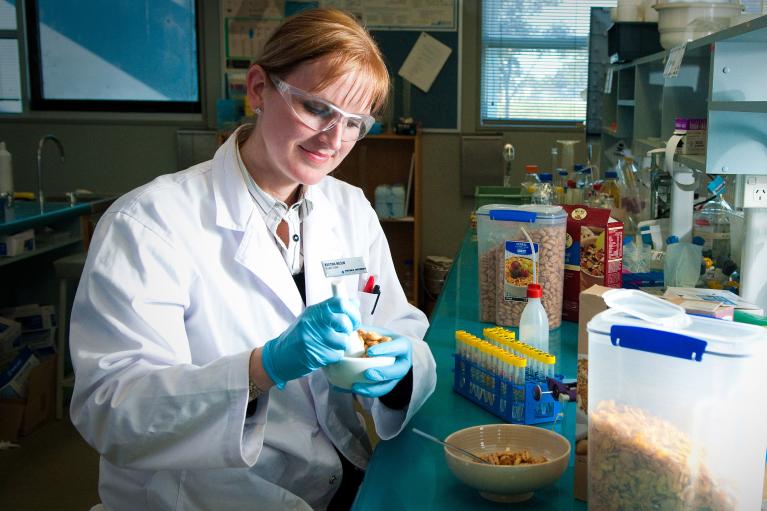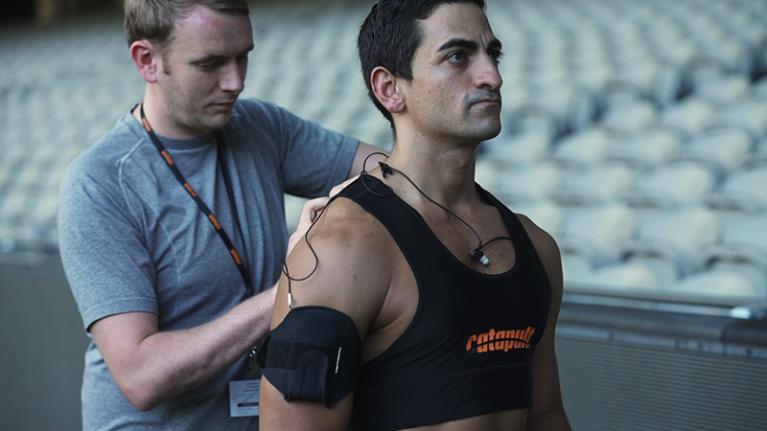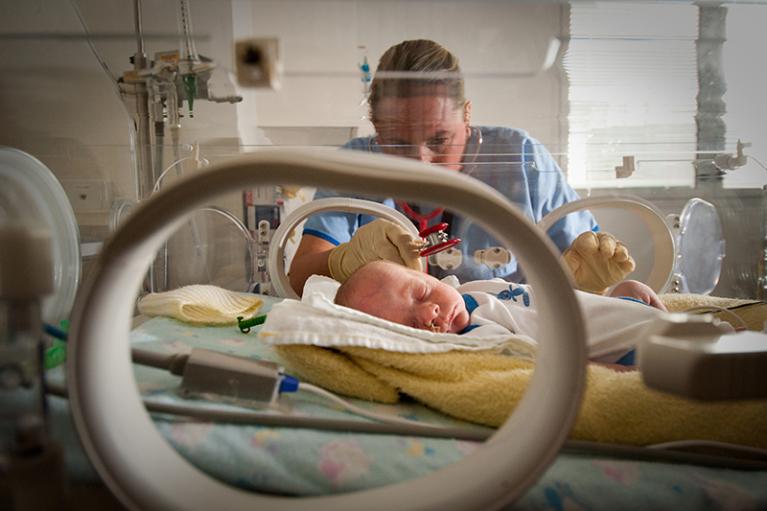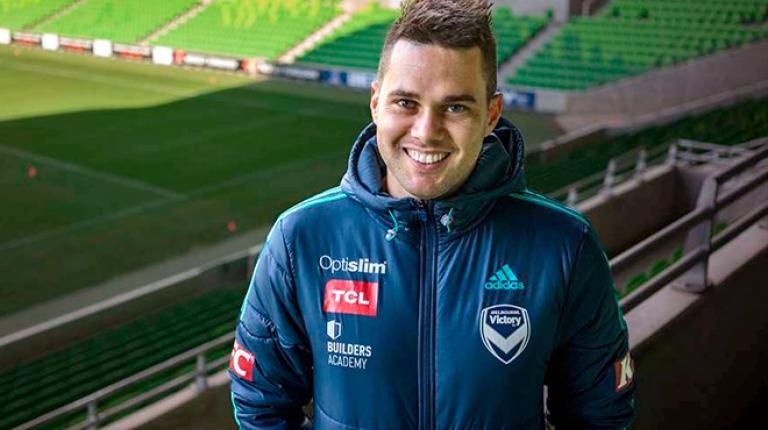Overview
Complete a Master of Research in 18 months, in the areas of health and sport. This program is tailored to graduates with a related bachelor degree, or an honours degree in a different discipline.
During your Master of Research at Victoria University, your study will be individualised according to your academic background. You'll gain crucial skills in research ethics and project design. Then you'll either study further research methods, or a disciplinary component relevant to your research. On passing the units with a 70% average, you’ll begin your own research in a field of personal passion and interest.
Victoria University conducts highly-ranked research:
- We are world number 7 for sport science education (ShanghaiRankings).
- We are ranked above world-standard in sport and health fields (Excellence in Research for Australia).
Within the Institute for Health & Sport you can study towards a qualification in a range of disciplines, including biomedical sciences, biotechnology, business, nursing, food science, sport science, and social sciences.
Specialise in your area of passion and personal interest within our research programs, which incorporate:
- diversity and inclusion
- health, mental health and disease
- sport performance
- sport business
- policy.
Further opportunities exist to complete a Master of Research in our Institute for Sustainable Industries & Liveable Cities.
World-class facilities
Sport & fitness
Our $68 million high-technology sport and exercise science research facilities include:
- altitude hotel
- biomechanics laboratories
- exercise physiology laboratories
- exercise rehabilitation laboratories
- motor control and biofeedback laboratories
- motor learning and skilled performance laboratories
- sport and exercise biochemistry laboratories.
Health & wellbeing
This $51.6 million five-level Western Centre for Health Research and Education building at Sunshine Hospital provides cutting-edge education, research and training facilities. Clinical trials area include:
- consulting rooms
- gait and balance gym
- falls and fracture clinic
- bone and muscle imaging (DXA and pQCT)
- metabolic testing.
Science labs
Our research centre at Werribee campus offers the latest technology for food analysis and scientific research.
We have labs dedicated the full range of science topics, including:
- cell culture and PC2 facilities
- thermodynamics
- analytical chemistry
- biotechnology
- biochemistry
- biomedicine
- polymer research
- chromatography
- elemental analysis
- food analysis
- small-animal testing
- imaging research.
Libraries & special collections
The VU Library holds several special collections and archives that are available to assist graduate students and staff in their research.
Partnerships & collaboration
VU has partnerships and collaborations with dozens of public institutions, health organisations and private sporting bodies.
We also work with other universities to provide the highest-level expertise and resources for our students.
Our partners include the following, among many others:
- AFL Australia
- Athletics Australia
- Australian Institute for Musculoskeletal Science (AIMSS)
- Australian Institute of Sport
- Australian Sports Commission
- Diabetes Australia Research Trust
- Headspace, the national youth mental health foundation
- National Heart Foundation
- Tennis Australia
- Turning Point Australia
- University of Melbourne
- Western Bulldogs
- Western Centre for Health Research and Education (WCHRE)
Research programs
Specialise in your area of passion and personal interest within Institute for Health and Sport (IHES) research programs:
- Mechanisms & Interventions in Health & Disease: Muscle, exercise and movement; Cardio-metabolic and muscle disorders; Cancer, autoimmunity and immunology
- Sport Performance & Business: Analytics and technology; Skills and development; Sport business, policy and integrity; Training.
- Clinical & Community Health & Wellbeing: Mental health and addiction; Maternal and child health; Capacity building in health and wellbeing
- Healthy & Inclusive Communities: Movement for healthy bodies and minds; Diversity inclusion and culture
Further research programs exist in VU's Institute for Sustainable Industries & Liveable Cities.
Research scholarships
Victoria University has several generous research scholarships available for successful Master of Research students. These scholarships are highly competitive.
There are also externally funded scholarships from dozens of organisations, some of which are aimed at postgraduate students.
Research opportunities & development
VU Research gives you opportunities to:
- connect with other researchers
- participate in research festivals and competitions
- develop your research skills
- get funding for your research
- publish and promote your findings.
We offer support for graduate researchers including:
- an orientation program
- a specialised Graduate Research School
- study spaces within your discipline area
- units to help you conceptualise and contextualise your research
- research ambassadors and student association.
Find out more about graduate opportunities at VU.
Study in your chosen discipline
Victoria University offers expert supervision for masters research in these areas:
- Applied Science
- Arts
- Biomedical Sciences
- Biotechnology
- Business
- Chemical Sciences
- Civil and Building Engineering
- Computer Science and Mathematics
- Education
- Electrical Engineering
- Environmental and Risk Engineering
- Food Science
- Law and Justice
- Mechanical Engineering
- Nursing
- Physics
- Sport Science
Some of these areas are better studied in a Master of Research within the Institute for Sustainable Industries & Liveable Cities.
A Master by Research to match your needs
Victoria University offers Master of Research options to fit your experience and qualifications.
Within our Health and Sport focus areas, we also offer:
- Master of Applied Research – a two-year full-time program for graduates of any bachelor program to move into a different discipline.
- Master of Research Practice – a one-year program for students with an honours degree in a relevant discipline.
You can also undertake a Masters of Research or choose from the same suite of research degrees within our Sustainable & Liveable Cities focus area.



Careers
A masters degree is increasingly important for a professional career. The Master of Research will ensure you are prepared to enter the competitive job market.
This course could lead to a career as researcher or academic tutor, and prepare you for a senior role in a number of specialist fields.
You'll have the experience and confidence to take a leading position in a range of fields related to your discipline:
- healthcare administration or management
- policy making and development
- public-sector research or writing
- sports manager or coach
- scientist.
Course structure
To attain the Master of Research, students will be required to complete the below mentioned components consisting of:
-
Required coursework units with a minimum of an average of 70% or have approved advanced standing for the unit(s)
-
A Research Thesis unit and have had their thesis classified as passed by the Dean, Graduate Research (or nominee)
Course structure and units
Core Units
-
- Unit code
- UGR7002
- Credits
- 12
-
- Unit code
- UGR7003
- Credits
- 12
Plus
Students with AQF7 qualification in a cognate discipline
-
- Unit code
- UGR7001
- Credits
- 12
Or
Students with AQF8 qualification in a non-cognate discipline
-
- Unit code
- UGR7006
- Credits
- 12
Thesis Units
-
- Unit code
- UGR8001
- Credits
- 12
Applied Science
-
- Unit code
- SHM8004
Arts
-
- Unit code
- APR8004
Biomedical Sciences
-
- Unit code
- RBM8005
Biotechnology
-
- Unit code
- RBT8004
Business
-
- Unit code
- BMO8014
Chemical Sciences
-
- Unit code
- RCS8004
Civil and Building Engineering
-
- Unit code
- VCC8004
Computer Science and Mathematics
-
- Unit code
- RCM8004
Education
-
- Unit code
- AER8013
Electrical Engineering
-
- Unit code
- VEE8004
Environmental and Risk Engineering
-
- Unit code
- VQT8005
Food Science
-
- Unit code
- RBF8004
Law and Justice
-
- Unit code
- BLO8014
Mechanical Engineering
-
- Unit code
- VMR8004
Nursing
-
- Unit code
- HNM8004
Physics
-
- Unit code
- RPH8004
Sport Science
-
- Unit code
- SSR8004
Learning outcomes
The Master of Research at VU provides students with the opportunity to undertake and complete a research project under supervision at Masters level (AQF 9). It will achieve this by providing students with a range of initial coursework units covering a) the nature and expectation of the research process and b) disciplinary specialisations where appropriate. The research progress will also be scaffolded by milestone requirements ensuring support throughout and quality and timely submission of the research.
AQF level 9 criteria: Graduates at this level will have specialised knowledge and skills for research, and/or professional practice and/or further learning and be able to:
Knowledge
- Critically review a body of knowledge that includes the understanding of recent developments in one or more disciplines
- Demonstrate advanced knowledge of research principles and methods applicable to the field of work or learning
Skills
- Conceptually map and critically evaluate theoretical knowledge and to reflect critically on its application to the chosen field
- Develop high level cognitive, technical and creative skills with which to investigate, analyse and synthesise complex information, problems, concepts and theories and to apply established theories to different bodies of knowledge or practice
- Develop high level cognitive, technical and creative skills required to generate, evaluate and synthesise complex ideas and concepts at an abstract level
- Analyse, critique and implement cognitive and technical skills required to design, use and evaluate research and research methods
- Develop effective communication and technical skills required to present a coherent and sustained argument and to disseminate research results to specialist and non-specialist audiences
- Demonstrate expertise in the technical and communication skills required to design, evaluate, implement, analyse, theorise and disseminate research that makes a contribution to knowledge.
Application of Knowledge and Skills
Graduates of a Master of Research will demonstrate the application of knowledge & skills:
- with creativity and initiative to new situations and/or for further learning
- with high level personal autonomy and accountability
- to plan and execute a substantial piece of research
What's a unit?
A unit or 'subject' is the actual class you'll attend in the process of completing a course.
Most courses have a mixture of compulsory 'core' units that you need to take and optional elective units that you can choose to take based on your area of interest, expertise or experience.
Credits
Each unit is worth a set amount of study credits based on the amount of time you study. Generally, 1 credit is equal to 1 hour of study per week.
Admission & pathways
Meeting the minimum admission requirements does not guarantee you entry into this course. Some courses receive more applications than the number of places available. In this situation we will also assess your education, work and other relevant experience.
If you do not meet the minimum requirements you may be eligible for one of our special admission programs. We also encourage you to explore our study pathways to help you reach your goal.
Find out more about how to apply for our courses, and our commitment to admissions transparency.
Entry requirements
Completion of an Australian Bachelor degree (or equivalent) in the same discipline with an average grade of Distinction (or equivalent) in the final year.
OR
Completion of an Australian Bachelor Honours degree (or equivalent) in a different discipline with an average grade of Distinction (or equivalent).
PLUS
Demonstrate English competency sufficient for study at masters level by providing evidence of one or more of the following:
- completion of one or more degrees with English as the language of instruction and assessment, undertaken in a predominantly English-speaking context (within the last two years)
- IELTS (or equivalent) overall score of 6.5 (with no band less than 6.0 in Listening, Reading, Writing and Speaking)
- a score of not less than 92 with no section score less than 22 in the internet-based Teaching of English Foreign Language (TOEFL) test, or English proficiency equivalent
- other documented proof of English proficiency equivalent to the above.
Find out if you meet the entry requirements, including English language and academic requirements.
Pathways from VU courses
There are many ways you can start your education journey at VU. Pathways offer an easy transition between courses at different levels, so that you can start with a certificate and progress right through to postgraduate study.
Find out more about pathways and credits.
Credit for skills and past study
Use our credit calculator to find out how much credit you could get towards your course, based on your previous study.
If you have completed study with another university or institution and believe you are eligible to receive credit for skills and past study, you can apply for advanced standing.
Applications for advanced standing can be made after a discussion with your course chair or academic adviser.
How to apply
We are currently accepting international applications, and we welcome you to apply for this course.
Click 'apply' to begin, and we will guide you through the application process.
If you have questions, please get in touch:
- Phone: +61 3 9919 1164
- Online: enquiry form
Information and fees listed above are for non-resident students. Fees are accurate at the time of viewing and will be subject to annual increases. Some courses require students to purchase equipment or clothing that they will need in the course. These equipment or clothing costs are not included in the course fees listed above – check your Letter of Offer for an estimate on non-tuition-fee-related expenses.
VU takes care to ensure the accuracy of this course information, but reserves the right to change or withdraw courses offered at any time. Please check that course information is current with the Student Contact Centre.



